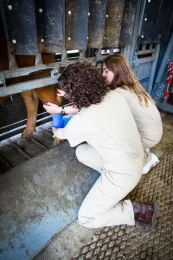
An objective of the center is to foster and support extension and outreach programs, delivering them to those interested in a broader understanding of agricultural and natural resource issues in the Sierra Foothills. We work to deliver the research and knowledge generated at the Center to end users including agricultural and conservation professionals, high school through college level students and the general public.
The center hosts workshops and forums centered on key rangeland and beef cattle topics as well as field days and outdoor learning labs for students.
Previous Workshops
Compost Addition on Foothill Rangeland -- November 14, 2018
Nov 14th from 10 AM to 12 PM
The Silver Lab at UC Berkeley discussed results from a long-term (10 year) compost addition trial on foothill rangeland and observed benefits for forage quality, quantity, and soil health characteristics. Researchers also spread compost for a new project that same day, supported by the 2017 Healthy Soils Demonstration Project and funded by Greenhouse Gas Reduction Funds and part of California Climate Investments. From this project participants learned about cost/benefits and practical approaches to applying compost at scale.
The Future of Farming & Ranching Forum - Feb. 22nd, 2014
The link below is the Agenda for the Future of Farming and Ranching Forum on February 22nd, 2014.
Agenda Future of Farming and Ranching Forum (PDF, 1.79MB)
Dan Macon, UCCE and Flying Mule Farm
Local Programs and Resources (PDF, 12.32MB)
Elisa Noble, Placer County Resource Conservation District
10 Principles for Maintaining and Expanding an Enterprise (PDF,736.5KB)
Shermain Hardesty, Cooperative Extension Specialist, Agricultural and Resource Economics, UC Small Farms Program
Expanding Your Roadmap - Getting to Scale (PDF, 5.81MB)
Matt Wentz, Lucchesi Vineyards
Student Presentation #1 : Lucchesi Vineyards and Winery (PDF 27.85MB)
Maxie Holmberg-Douglas, Davi Pettinato, and Kari Jarvis - Nevada Union FFA Students
January 29th, 2014 Drought Workshop
The following links provide hard copies of the presentations and information offered at the workshop titled "Mitigating Drought: Optimizing pasture, supplemental feed and managing risk" held in Browns Valley on January 29th, 2014.
Managing Drought - Introduction - Glenn Nader (PDF, 633.68) / YouTube
Rangeland Forage Production - Forero (PDF, 785.12) / YouTube
Using Stored Feed on Annual Range - Davy (PDF, 1.2MB) / YouTube
Drought and Irrigated Pasture - Forero (PDF, 1.5MB) / YouTube
Grazing Management During Drought Conditions - Ingram (PDF, 2.56MB) / YouTube
Optimizing Supplemental Feed - Oltjen (PDF, 385.82) / YouTube
Alternative Protein Supplementation - Sainz (PDF, 5.5MB) / YouTube
Roughage Supplementation - Nader (PDF, 927.75KB) / YouTube
Drought Economics - Nader (PDF, 163B) / YouTube
Cattle Management Considerations During Drought (PDF,213MB) / YouTube
Federal Assistance Programs for Drought - Oldfield (PDF, 109.3KB) / YouTube
Feeding and Nutritional Aspects of Roughage Supplementation (YouTube)
What did Ranchers Learn from the 1970's Drought? (YouTube)
The following materials have been collected from UCCE Livestock Specialists, UC Davis animal science reports, the Cattlemen's Association, and various other accredited sources to provide ranchers with useful information.
Annual Range Forage Production(PDF, 163B)
Drought Economics (PDF,96.34KB)
Early Rains Alter Range Forage (PDF, 755.05KB)
Livestock Management During Drought (PDF, 104.11KB)
Oak Toxicity and Treatment (PDF, 88.69KB)
Poisonous Plants to Livestock (PDF, 2.85MB)
Use of Alternative Feedstuffs in Your Beef Operation (PDF, 603.43KB)
Please see our YouTube channel for more
Workshops at Sierra Foothill REC.
Medusahead & Barb Goatgrass
Medusahead (Taeniatherum caput-medusae) and barb goatgrass (Aegilops triuncialis) are two aggressive annual grasses that are negatively impacting rangelands across the western United States. These winter annuals establish and spread quickly, creating undesirable monocultures. Invasion of these species can result in the following: altered nutrient and hydrologic cycling, modified fire regimes, diminished wildlife habitat and reduced forage quality.
Reference the below publications, links and educational resources for information about these undesired rangeland grasses.
Handouts & Informational Resources
JUST ADDED:
Plant-soil feedbacks in medusahead invasion (PDF, 11.93KB)
By Emily Farrer (November 2024)
ANR PUBLICATION:
Timing of Grazing and Mowing Treatments (PDF, 163B)
by P. Brownsey, J. Davy, T. Becchetti, M. Easley, J. James and E. Laca-October 2016
Presentations & Handouts from June 28, 2016 Workshop:
Herbicide Options for Medusahead and Barb Goatgrass Control
by Dr. Joe DiTomaso, UC Davis (Power Point Presentation-June 28, 2016)
by Josh Davy, UCCE Tehama, Glenn, Colusa (Power Point Presentation-June 28, 2016)
Aminopyralid for Medusahead Control(PDF, 2.12MB
by Josh Davy, UCCE Tehama, Glenn, Colusa (Power Point Presentation-June 28, 2016)
Cost:Benefit to Livestock Production (PDF, 1.14MB)
by Jeremy James, UC SFREC (Handout-June 28, 2016)
Ranch-Scale Strategies for Managing Weeds (PDF, 1.78MB)
by Philip Brownsey, UC SFREC (Power Point Presentation-June 28, 2016)
On the Ground Success Stories (PDF, 10.71MB)
by Pamela Beitz, East Bay Parks (Power Point Presentation-June 28, 2016)
On the Ground Success Stories (PDF, 4.7MB)
by Justin Wages, Placer Land Trust (Power Point Presentation-June 28, 2016)
Timing grazing & mowing treatments based on plant growth stage (PDF, 1.18MB)
by J. James, P. Brownsey, E. Laca, J. Davy, T. Becchetti, & M. Easley (Handout for land managers-September 23, 2015)
Medusahead & Barb Goatgrass Forum (PDF, 14.83MB) (Printed Materials / Presentations) - YouTube
Held November 5th, 2013, at the U.C. Sierra Foothill Research & Extension Center
Barb Goatgrass (Publication focused on biology and control)
by J. Davy, J. Ditomaso and E. Laca
SFREC Animal Healthcare Program

These documents describe the routine animal health procedures followed at the University of California Sierra Foothill Research and Extension Center (SFREC). These guidelines are reviewed, updated and approved by the SFREC Animal Care and Use Committee. The active ingredients and vaccines are available under a number of brand names. Brand names used in these recommendations are examples only and not specific endorsements or recommendations.
*ALWAYS READ AND CAREFULLY FOLLOW DRUG AND VACCINE LABEL INSTRUCTIONS*

